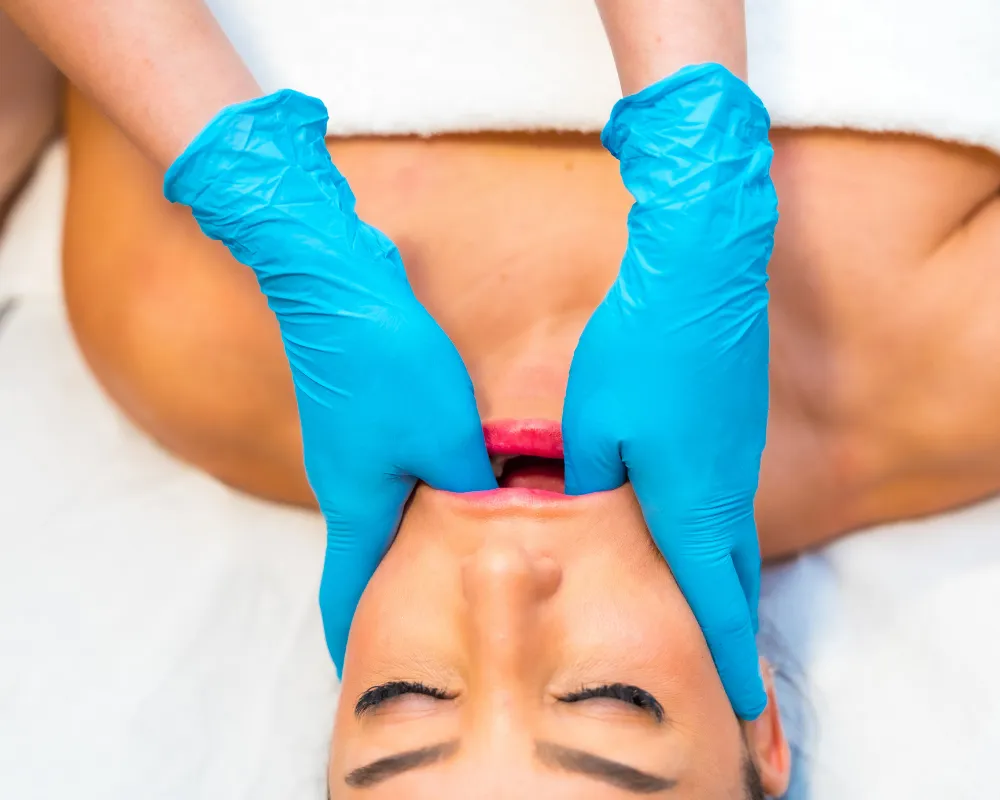TMJ dysfunction

Understanding TMJ Dysfunction: A Guide to Symptoms, Causes, Diagnosis, and Treatment
Have you ever felt pain in your jaw that makes it hard to eat or talk? If so, you might be dealing with TMJ dysfunction. TMJ stands for temporomandibular joint, which is the joint that connects your mandible or lower jaw to the temporal area of your head. It’s like a sliding door that lets you open and close your mouth smoothly. When something goes wrong with this joint or the muscles around it, it’s called temporomandibular disorder. It can be abbreviated as TMD for short. Many people just say “TMJ” to refer to the problem. This condition affects millions of people, but the good news is we can help with it in our office!
TMJ dysfunction isn’t just one thing—it’s a group of issues that can cause pain and trouble moving your jaw. The joint itself is located right in front of your ears bilaterally. It works with muscles, ligaments, and a small disc that acts like a cushion to help your jaw move up, down, and side to side. When the joint gets irritated or damaged, it can lead to discomfort that spreads to other areas like your ears, neck, or even your head. Think of it like a squeaky door hinge in your house—if it’s not oiled right, it doesn’t work well and makes noise.
Common symptoms of TMJ dysfunction can vary from person to person, but they usually involve pain or stiffness in the jaw area. You might feel a dull ache or sharp pain when you chew, yawn, or talk a lot. Some people hear clicking or grinding sounds when they move their jaw, like gravel crunching under your shoes. Others may hear popping or clunking when they open or close. Headaches are common too, especially around your temples. Your jaw might lock up, making it hard to open your mouth wide, or it could feel like your bite is off, as if your teeth don’t fit together right. Other signs include earaches without an infection, ringing in your ears, or even dizziness. These symptoms can come and go, and they might get worse with stress or after eating tough foods like steak or gum. If you’re noticing these, it’s a good idea to pay attention because ignoring them could make things tougher over time.
What causes TMJ dysfunction? There are several reasons why this happens, and sometimes doctors aren’t sure of the exact one. One big cause is injury, like getting hit in the face during sports or a car accident, which can damage the joint or muscles. Grinding or clenching your teeth, often at night when you’re asleep, puts extra pressure on the joint—this is called bruxism and can wear it down over time. Stress plays a role too, because when you’re worried, you might tense up your jaw muscles without realizing it. Arthritis, which is swelling in the joints, can affect the TMJ just like it does knees or hands. Poor posture, like slouching at your desk, can strain your neck and jaw. Even things like chewing gum too much or having teeth that don’t line up properly (called malocclusion) can contribute. In some cases, it’s a mix of these factors, and women seem to get it more often than men, possibly due to hormones or other body differences.
Diagnosing TMJ dysfunction starts with a thorough discussion of your symptoms and health history. We’ll ask questions like when the pain started, what makes it better or worse, and if you’ve had any injuries. During the exam I will feel your jaw muscles for tenderness and listen for those clicking sounds while you open and close your mouth. I might measure how wide you can open your mouth or check how your teeth fit together. If needed, they I might order pictures of your jaw, like X-rays to see the bones or an MRI to look at the soft tissues and disc.
When it comes to treatment options, we offer several proven methods. Manual therapy to loosen muscles both inside and outside the jaw is one of the best treatments. There are acupressure points inside the mouth that can increase jaw range of motion and can help eliminate temporal headaches. Acupuncture can relax the tight muscles of your jaw, face, and neck, and improve blood flow. Cold laser therapy can lower inflammation and pain levels, and can speed healing. Chiropractic care focuses on aligning your spine and jaw naturally, which can relieve pressure on the TMJ without drugs or surgery.
The key to managing TMJ dysfunction is catching it early and finding what works for you. Don’t hesitate to come into our office—getting help can make a big difference in your daily life. With the right approach, most people find relief and get back to enjoying meals and conversations without worry!

Office Hours
Monday
9:30am – 1:00pm
3:00pm – 6:00pm
Tuesday
9:30am – 1:00pm
Wednesday
9:30am – 1:00pm
3:00pm – 6:00pm
Thursday
9:30am – 1:00pm
3:00pm – 6:00pm
Friday, Saturday & Sunday
Closed

2540 Green Forest Ln, Unit 102
Lutz, FL 33558
P: (813) 575-3550
manager@huntholistic.com
See What Our Patients Are Saying

Connect With Hunt Holistic Chiropractic!
We are committed to your well being and helping you overcome your health challenges. Our team has decades of combined experience and our focus is on understanding your unique health challenges and working with you to help you achieve optimal health.
Hunt Holistic Chiropractic is your trusted chiropractor serving all of Florida’s Gulf Coast. You can learn more about us here. If you have questions or would like to schedule a visit, you can contact us here. And, finally, feel free to browse our Frequently Asked Questions resource section for more information about different services and conditions.